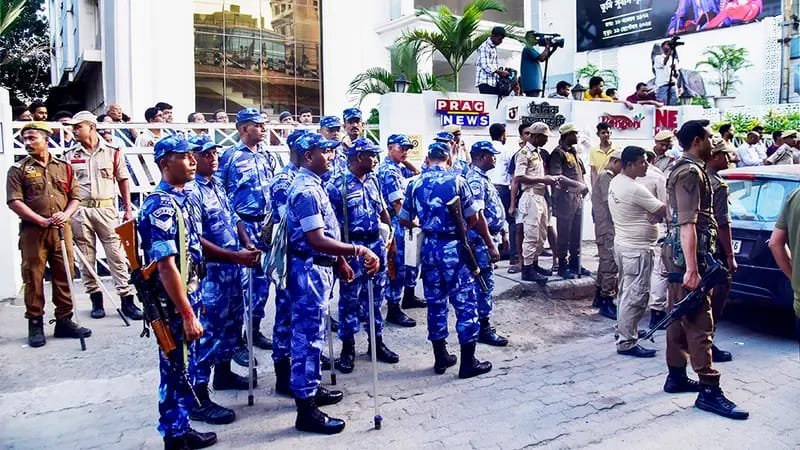The sudden death of cultural icon Zubeen Garg in Singapore on September 19 has left Assam shaken, its people grieving, and its government under intense scrutiny. Officially recorded as a case of drowning while swimming at sea, the incident has quickly spiralled into a storm of public outrage, political confrontation, and widespread suspicion of foul play. Within days of the tragedy, Assam Chief Minister Himanta Biswa Sarma Direct the state Director General of Police for probe into Zubeen Garg Death this move came after more than 60 FIRs were filed across the state against the organisers of the Northeast India Festival, where Garg had gone to perform. The Chief Minister assured that the SIT, backed by the CID and forensic support from Delhi, would operate with “full professional integrity.”
Leader of the Opposition Debabrata Saikia has written to the President of India demanding a CBI probe under the supervision of a Gwauhati High Court judge, citing the “suspicious circumstances” of Garg’s demise. According to him, jurisdictional challenges and conflicting testimonies limit the scope of Assam Police’s investigation. His letter alleged that Garg had confided in associates that he was pressured into attending the Singapore event, breaking his usual travel patterns and leaving him isolated. Other political parties, including Assam Jatiya Parishad (AJP) and Raijor Dal (RD), echoed the same demand, stressing that only the CBI has the authority to pursue leads across international borders. Their argument is clear: a state-level probe cannot be trusted to uncover the full truth about an incident that occurred abroad and involves organisers with strong political and bureaucratic connections.
The focus of much of this outrage is Shyamkanu Mahanta, chief organiser of the festival, and a man with deep family ties to the state’s power structure. His contradictory statements and proximity to political circles have raised eyebrows. In an unprecedented step, the Assam government has banned him from holding events in the state and withdrawn all financial support or sponsorship for his ventures. Equally controversial is Sanjive Narain, owner of Prag News, who was also present in Singapore. Narain claimed he was not on the yacht where Garg’s fatal swim took place and insisted, he only rushed to help after being informed. But angry fans are unconvinced. Protests erupted outside his office in Guwahati, with demands for his immediate arrest. “He is an accused in a criminal case. Why is he still free?” one protestor asked. The suspicion deepens because Garg’s travel arrangements were uncharacteristic. Reports allege he was told to travel with limited companions, depriving him of his usual protective circle. Such details, opposition leaders argue, point towards calculated coercion and even the possibility of a conspiracy.
For the people of Assam, Zubeen Garg was more than a singer. He was a voice of defiance, a symbol of cultural pride, and a figure who spoke of unity beyond caste and religion. His untimely death feels, to many, like a silencing of that voice. That is why demands for justice have spilled from political debates into the streets. The state has already witnessed mass protests, emotional outpourings at his funeral, and a relentless call for accountability. Fans and citizens alike are unwilling to settle for half-answers, particularly when those linked to the tragedy wield significant influence. The Assam government’s decision to form an SIT might be seen as decisive, but in reality, it raises doubts instead of settling them. An SIT under state control cannot escape perceptions of bias, especially when the accused have strong ties with bureaucratic and political elites. Moreover, an investigation limited to Indian jurisdiction cannot fully probe an incident that occurred in Singapore. Forensic evidence, witness statements, and official records abroad fall outside the reach of Assam Police. Without international coordination at the highest level, critical leads risk being lost. This is why calls for a CBI investigation under judicial supervision have struck a chord with the public. The death of Zubeen Garg is not just a personal tragedy—it is a test of India’s democratic institutions. Will the government ensure a transparent, independent, and internationally credible investigation? Or will the case fade into bureaucratic stonewalling and political compromise?

In the end, the government’s handling of Zubeen Garg’s death has been nothing short of inadequate, muddled, and deeply suspicious. Announcing an SIT may sound decisive, but when those under scrutiny are closely linked to Assam’s political and bureaucratic elite, the move reeks of damage control rather than genuine pursuit of justice. Worse still, the fact that this tragedy took place on foreign soil makes it painfully clear that a state-level probe has neither the authority nor the independence to dig deep. The government’s reluctance to immediately hand the case over to the CBI under judicial monitoring only strengthens public suspicion that there is more to hide than to reveal. By shielding powerful organisers and dragging its feet on arrests, the state risks turning this into yet another high-profile cover-up where the powerful walk free and the truth is buried. Zubeen Garg was not just a singer; he was a cultural conscience, a fearless voice that refused to bend before power. If his death is reduced to a bureaucratic file marked “accidental drowning,” it will not only be an insult to his memory but also a betrayal of the millions who looked up to him. This case is no longer just about a tragic accident—it is about whether the government dares to stand on the side of truth or whether it will continue to cower behind excuses, protecting its own at the cost of justice.
If justice for Zubeen is denied, the Assam government must be prepared to face the fury of its people. Silence, half-measures, and token probes will not be accepted. The public has made it clear: this is a fight for truth, and they will not rest until every thread of conspiracy is exposed, no matter who stands guilty.
